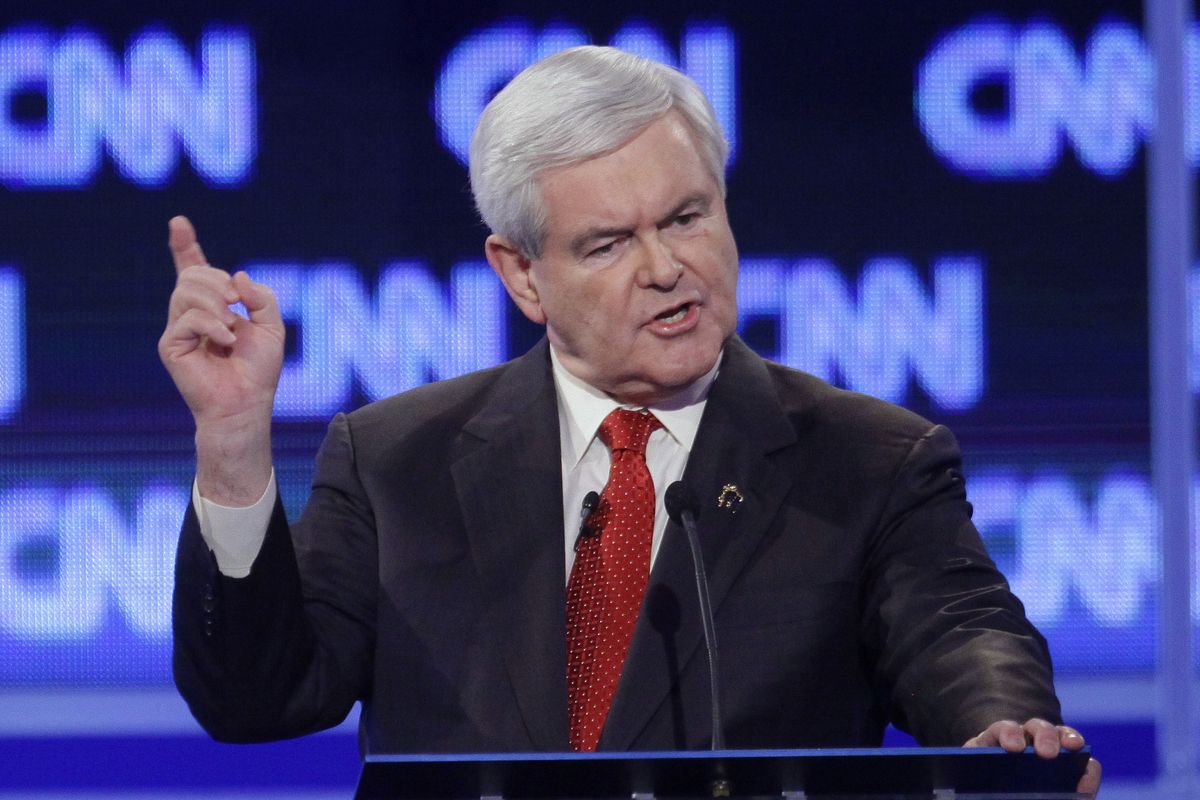Gingrich wins S.C. primary
Strong debate performances help him topple Romney

CHARLESTON, S.C. – Newt Gingrich surged to victory Saturday in the South Carolina primary, riding a pair of strong debate performances to overtake Mitt Romney and stop his seemingly relentless march to the GOP nomination.
NBC News called the race for the former House speaker almost immediately after the polls closed, a repeat of what happened 11 days ago in New Hampshire, but with a much different result.
Romney finished more than 10 percentage points behind the former House speaker Saturday, with Rick Santorum and Ron Paul a distant third and fourth, respectively.
The former Massachusetts governor vowed to make his case across the country, noting that the balloting had just begun and implicitly underscoring the financial and organizational advantages he still wields in the race.
The results – which seemed improbable as recently as a week ago – added yet another twist to a roller-coaster campaign, marking the first time ever that three different contestants have won the first three Republican contests.
More importantly, the outcome stripped Romney of the brief air of inevitability he enjoyed after seemingly winning Iowa – an outcome reversed this week in Santorum’s favor – and romping to victory in New Hampshire.
Gingrich, flashing just an occasional smile, marked his victory with a sober address to supporters in Columbia, praising each of his opponents and returning to a favorite tack – bashing the media and “the elites in Washington and New York (who) have no understanding, no care, no connection, no reliability” and fail to represent the American people.
“It’s not that I am a good debater,” he said, ignoring the boisterous chants of supporters and delivering his remarks in the tone of a college lecture. “It is that I articulate the deepest-felt values of the American people.”
South Carolina’s results promised, at the very least, a costly and heated fight ahead of the next primary, Jan. 31 in Florida, and possibly beyond – to Nevada on Feb. 4 and into March, when a rush of contests begins.
South Carolina, a state infamous for its unruly politics, lived up to its reputation, hosting one of the most raucous weeks of the tumultuous presidential campaign.
Romney arrived in seemingly commanding position; Gingrich limped in, once again left for dead following his poor showings in Iowa and New Hampshire.
But after a pair of contentious debates and the withdrawal of two candidates – Texas Gov. Rick Perry and former Utah Gov. Jon Huntsman – it was Gingrich who was surging and Romney who was suddenly peering over his shoulder.
Interviews with voters leaving the polls Saturday showed why: Slightly more than half made up their minds in the last few days, and nearly 90 percent said a big factor was the debates, which Gingrich dominated.
It was also a far more conservative turnout than the one that buoyed Romney in Iowa and New Hampshire, according to the exit polls conducted by a network consortium. More than 6 in 10 voters identified themselves as born-again or evangelical Christians, a group that has never warmed to Romney.
Riding a wave of successive victories – or so it seemed – in Iowa and New Hampshire, the former governor appeared set to wrap up the nomination with a win in the Palmetto State, which, politicians here like to point out, has backed every Republican nominee since 1980.
But Iowa was taken away from Romney and awarded to Santorum after a review of caucus ballots showed the former Pennsylvania senator winning by 34 votes. His one-two victories gone, Romney no longer seemed so inevitable.
On the campaign trail and debate stage, he was persistently on the defensive, struggling with calls to release his tax returns and defend his record at Bain Capital, the investment company he co-founded, against charges of “vulture” capitalism.
For the first time in the race, Romney also came under sustained attack on the TV airwaves, which were bombarded with dozens of commercials blaring – for and against the different candidates – every hour from morning past midnight.
Gingrich’s strong showing trumped the good news Santorum received out of Iowa and stymied the former senator’s efforts to rally South Carolina’s large population of evangelical and Christian conservatives behind his faith-and-family message.
Paul was never much of a factor. He showed up to debates but otherwise kept a light campaign schedule. His comparatively dovish defense and foreign policy proposals were never a good fit for this strongly pro-military state.
There were 25 delegates at stake Saturday, a reduction of 50 percent after the state was penalized for advancing its primary to stay ahead of Florida, which jumped the queue to vote Jan. 31. But South Carolina was less about winning delegates than gaining momentum, just like the first two contests in Iowa and New Hampshire.
All four candidates are set to meet in the 18th debate of the campaign Monday night in Tampa.